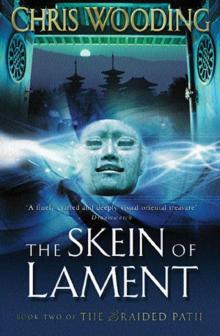- Home
- Chris Wooding
The Ascendancy Veil: Book Three of the Braided Path Page 6
The Ascendancy Veil: Book Three of the Braided Path Read online
Page 6
They found their contact in the Poor Quarter as arranged. Nomoru led them, having grown up among the endless gang warfare that consumed the shambolic, poverty-stricken alleyways of this section of Axekami. Even here, the change in the city was evident. As squalid as it was, its occupants had always been angry, their tempers quickly roused, railing against their conditions rather than meekly submitting to them; but now the alleyways were quiet and doors were kept closed. Those people that they saw were thin and starving. The famine was biting even in the capital, and as always, the underprivileged were the first to suffer.
The sight made Kaiku think of Tsata, with his alien views on her society, and she wondered what he would make of all this. The memory of him brought a twinge of sadness. He had almost entirely slipped her mind over the years, buried as she was in studying the ways of the Red Order under Cailin; but his influence had lasted, and she often found herself trying to think of things from his viewpoint to lend herself a measure of objectivity. It was because nobody questioned the way things were that the Empire was in this situation in the first place: the ingrained belief that society could not do without the Weavers had allowed them to wrest the Empire from the hands of those who created it. Tsata had helped her see that, but then he had left her, returning to his homeland to warn his people about what was happening in Saramyr. As they walked through the dereliction of the Poor Quarter, she wondered vaguely if he would ever come back.
Their contact lived on the second storey of a tumbledown building, and they had to climb a set of rickety steps propped up with makeshift kamako cane scaffolding to get to the door. Kaiku’s uneasiness had grown during their journey. Distantly she could hear the rumble and clank of one of the Weavers’ beetle-like buildings in the eerily subdued quiet. The atmosphere here was an effort to breathe and tasted foul. If it were not for the fact that she knew her body was subtly and instinctively neutralising the poisons she was inhaling, she would have worried what damage it might be doing to her. Gods, what must it be like to live in this miasma?
Nomoru struck the chime and the door was opened by a sallow, ill-looking man. His eyes widened in recognition as he saw the scout. After an awkward instant, they exchanged passwords and he let them inside. He took them into a threadbare room where tatty mats lay on the floor. Sliding doors were left half-open to expose cupboards of junk crockery and chipped ornaments, and thin veils were draped over the window-arches, obscuring the view and making the room dim. An imposing, shaven-headed figure had moved one of the veils aside a little and was peering out at the street below. As they entered, he let the veil fall and turned to face them. He was ugly, with thick lips and a squashed nose and a brow that fell in a natural scowl.
‘Nomoru?’ he said. ‘Gods, I never thought I’d see you again. You haven’t changed a bit.’
Nomoru shrugged without replying.
He looked at the Sisters. ‘And you must be Kaiku and Phaeca then. Which is which?’
They introduced themselves properly, despite his informality, bowing in the correct manner for their relative social stations.
‘Good,’ he said. ‘I imagine you’ve guessed me by now. Juto en Garika. And that’s Lon in the doorway. There’s more of us, but we don’t gather here. For now, you deal with me and Lon, and that’s all.’
Kaiku studied him closely. His accent and manner all bespoke a life in the Poor Quarter. Like many here, he had no family name, but he took in its place the name of his gang, and the Low Saramyrrhic en prefix meaning literally ‘a part of’. His sheer physical presence was intimidating. Ordinarily, Kaiku would not have felt threatened by that – not now she was a Sister of the Red Order – but the shock of seeing how Axekami had fallen and the fact that she could not use her powers within its walls had combined to make her feel on edge.
He sat down cross-legged on a mat without inviting anyone else to, but Nomoru sat down anyway and the Sisters followed her lead. Lon slipped unobtrusively away. The room was haphazardly set out with no thought to aesthetics, which mildly offended Kaiku’s highborn sensibilities, but she told herself not to be priggish. If this was as much as she had to deal with during her time in Axekami, she would count herself blessed by Shintu.
‘Let’s get to it, then,’ Juto said. He cast a glance at the Sisters. ‘First thing, though: we all know who you are and your particular . . . abilities.’ Kaiku was pleased to note that the familiar note of disgust when referring to her Aberrant powers was absent in his tone. ‘It’d be best if none of us mentioned them aloud. Plots and schemes come and go, but anyone catches a whiff of you and they’ll trip over themselves to sell you to the Blackguard.’ He caught Phaeca’s glance towards the doorway. ‘Lon knows. You can trust him. Nobody else, though.’
‘Do you two know each other?’ Phaeca asked, referring to Juto and Nomoru. Kaiku had been wondering the same thing ever since Juto had first spoken.
Juto grinned, exposing big, browned teeth. ‘We don’t forget our own.’
‘You were part of the same gang?’ Phaeca prompted her. Nomoru just gave her a sullen glare in reply.
‘Some time ago now,’ Juto said. ‘We’d given her up.’ His gaze flickered to Nomoru. ‘I went looking for you. Tracked you to the Inker that did you last. He said you—’
‘Juto!’ she snapped suddenly, cutting him off. ‘Not their business.’
His eyes blazed for a moment, and then an expression of dangerous calm settled on his face. ‘You haven’t been Nomoru en Garika for a long while,’ he said with an unmistakable threat in his voice. ‘You be careful how you speak to me.’
She just stared at him, a challenge in the set of her shoulders, a scrawny creature with hair in spiky tangles levelling with somebody twice her bulk. There was no fear in either of them.
‘How are things in the city?’ Kaiku asked, in an attempt to break the stalemate. It worked better than she intended, for Juto bellowed with laughter and shook his head.
‘Were you wearing blinkers on the way here?’ he asked in disbelief. ‘The people are crushed. The Lord Protector has the city under his boot heel and he’ll keep on grinding until all that’s left is powder and bone. Axekami is the lucky recipient of most of the remaining food in the north-west and still hundreds starve to death every day. The only good thing I can say is that at least we don’t have the nobles siphoning all the supplies as we would have done under the magnificent government of the Empire.’ His sarcasm was obvious and scathing. ‘The workers get the food. And the Blackguard and the Weavers’ damned Aberrant army, of course; that goes without saying. But the Poor Quarter suffers as ever, because some of us would rather die than go to labour in those gods-cursed constructions they’ve built in place of our temples.’
‘And what do they do in there?’ Phaeca asked. The Sisters had never been able to establish the purpose of the Weavers’ buildings in the cities.
Juto curled his lip. ‘No idea. Each worker only knows his own task, and what all those tasks amount to, nobody seems to be able to work out. They don’t seem to produce anything. That’s the cursed mystery of the things.’
He got to his feet and went to the window-arch again, looking out past the veil. When he spoke again, it was more measured. ‘Then there’s this murk. Old men cough themselves to death, mothers miscarry, the sick don’t get better and cuts gets infected. What kind of people take over a city and then poison their own well? What idiocy is that?’
The question did not seem directed at any of them, so they stayed silent. He turned around and leaned against the wall with his arms crossed. ‘They’ve outlawed the gods,’ he went on. ‘All of them. They’re crippling any chance of rebellion by not allowing us to gather and coordinate. That’s the reason everybody thinks they took down the temples. But heart’s blood, it doesn’t make sense! Letting the people have their faith would keep them calm, discourage revolt.’ He scratched his ear and snorted. ‘Some say they just want us to know that we haven’t any hope. I don’t believe that. I just think they hate the gods. Eithe
r that, or they’re afraid of them.’
‘And has it worked?’ Kaiku asked. ‘Do you think Axekami could be persuaded to rise against their oppressors?’
Juto sat down again, shaking his head as he did so. ‘You could march an army up to the gates and they wouldn’t dare to open them. It’s not only a matter of spirit, though there’s little enough of that left. We’re weak and sickly. The Blackguard are fed and strong and there’s more of them each month because people join up all the time. They see their families dying and their principles fade like mist in the morning sun. Then you’ve got informers and spies, all working to fill their bellies. The Weavers seem to know everything, whether by the cursed powers they possess or by the folk who’ve sold themselves. As fast as rumours start spreading about a new leader there are rumours that they’ve died or disappeared. And on top of all that, there’s the Aberrants. The Weavers just have to say the word and the streets are full of them.’
‘What about Lucia?’ Nomoru interjected. ‘Could rouse them then. If Lucia came.’
‘Lucia?’ Juto mocked. ‘I won’t deny the people would welcome anyone in place of the Weavers, Aberrant or not, but a legendary figure’s no good if they’re not here. I won’t believe she’s real till I see her with my own eyes, and even then she’d have to be in golden armour with the gods themselves singing her praises from the skies before I’d count myself safe enough to turn on the Weavers.’ His tone was becoming bitter now. ‘You think you can even get to Axekami with an army? I don’t. The Weavers would crush you before you got north of the Fault.’
Kaiku took the disappointment stoically. She had expected such a response anyway. It did not take someone of Phaeca’s skills to divine that Yugi’s faint hope of picking up the scent of revolt would be thwarted; Kaiku had guessed that as soon as they entered the city. She did not think he had seriously entertained the possibility anyway.
‘Enough of our troubles,’ said Juto, hunkering forward and giving them a smile that was more like a snarl. ‘What about yours? How goes the battle in the south?’
‘That is a puzzle,’ Kaiku said, brushing her hair behind her ear. ‘It is much as we left it almost a fortnight ago. The Weavers have occupied Juraka, but there has been no move to cross the river as yet, and the feya-kori seem to have disappeared.’
‘Ah, there’s the meat of it,’ said Juto. ‘The feya-kori.’
‘They came from Axekami,’ Phaeca said. ‘Do you know where?’
‘I have my suspicions,’ Juto said. ‘But I’ve been waiting for you to arrive so we can take a look.’
‘When can we go?’
‘Tonight,’ he said. ‘After curfew.’
Kaiku considered this for a moment, then a small frown crossed her brow. ‘What exactly do the Blackguard do to enforce this curfew?’
Juto grinned nastily. ‘They let the Aberrants out.’
SIX
The Lord Protector Avun tu Koli trod warily through the chambers of his home. Despite Kakre’s assurances that he would not be harmed, he could never be even slightly at ease in the areas that the Weave-lord had taken to inhabiting. The upper levels of the Imperial Keep had become an asylum.
The great truncated pyramid stood atop a bluff on the crest of the highest hill in Axekami. It was a masterpiece of architecture, arguably still unsurpassed since the fourth Blood Emperor Huira tu Lilira began building it more than a thousand years ago. The complex sculptures of gold and bronze that swarmed across its tiered sides had stunned visitors for a millennium with their intricacy and power, while the four slender towers that stood at its corners, linked to the main body of the Keep by ornate bridges, were as impressive now as they were all that time ago.
Throughout history, there had always been large sections of the Keep that were empty, simply because no high family had enough members to fill a building so huge, nor needed a retinue so large as to take up the spare room. Avun wondered distastefully what his ancestors might make of things now that the new occupants had arrived, and the Keep was finally filled.
The route to the Sun Chamber took him through room after gloomy room of depravity and madness. Weavers gibbered and rocked in clusters, hunched together, their Masks iridescing subtly as they shared the ecstatic bliss of their unseen world. Walls were smeared in blood and excrement, or scrawled with arcane languages which had sprung whole from the subconscious of the author. Abstract mathematics and diagrams, nonsense mingling with insights of staggering genius, were scored into priceless marble pillars or daubed across artwork that was hundreds of years old. The flyblown corpse of a servant, his lips and jaw eaten away by a roaming dog, lay in the centre of a room surrounded by strange clay sculptures, each precisely a foot high. An exquisitely clean and orderly bathing-chamber was guarded by a lunatic Weaver who spent his time obsessively tracing the grains of the wooden floor with his eye, and who screamed and flailed at anyone who entered.
Yet among these horrors other Weavers shuffled and limped, younger ones who had not yet fallen prey to the insanity of their kind. They were Kakre’s lieutenants and aides, an assortment of bizarre figures who maintained their own private domains amid the chaos of the upper levels. Their own depravities only emerged after Weaving, when the trauma of withdrawal would trigger their particular manias, which were as varied and repulsive as imagination would allow.
The Weavers had always been careful to conceal the true extent of the damage that their Masks did to them, hiding away their worst casualties in their mountain monasteries; but here the inexorable and terrifying erosion of their minds was appallingly obvious. At least, Avun thought, the famine had provided plenty of victims for those Weavers who liked to kill or rape. He tried not to waste his trained servants when he could help it, preferring to use peasants or townsfolk culled from the Poor Quarter, but the necessity of navigating through this bedlam to attend to the whims of the Weavers had claimed the lives of many of them. It seemed that Kakre’s decree of protection extended only to Avun, and anyone else was fair game.
The Sun Chamber had once been beautiful. The roof was a dome of faded gold and green, with great petal-shaped windows following its contours down from the flamboyant boss at its centre. It was rare enough to see glass in Saramyr windows anyway, but these were magnificent creations of many different colours whose designs had caught the light of Nuki’s eye in days past and shone down onto the enormous circular mosaic on the floor. Now the light was weak and grim and flat, and what it fell on made Avun wish for darkness.
Kakre had taken the Sun Chamber for his own, and decorated it with the products of his craft. In the three galleries of wood and gold, where in ancient times councils had stood to attend to a speaker or watch a performance on the floor below, malformed and disturbing shapes hid in the gloom. Avun tried not to think about them. Here was where Kakre came to display some of the appalling art he made in his chambers many levels below. Every creation here was sheathed in skin taken from men and women and beasts while they were still alive, arranged as if in audience.
They had been moved around since last time Avun visited, and he unconsciously sought out the figures that had stuck most in his mind: the hunched figure whose left side was stitched from the skin of a man and whose right side from a woman; the winged being whose feathers were made of tanned and leathery sinew; the shrieking man from whose gaping mouth another face peered. There were animals and birds too, and other things not humanoid, frames overlaid with patchwork epidermis of many shades to form strange geometric shapes, or forms so repellent to the eye that they could not be classified. The accumulation of torture and pain and terror this room represented was more than even a man as cold as Avun could bear to consider. The faint shrieks of the tormented Weavers in nearby rooms only served to disconcert him further.
The Weave-lord Kakre was there, of course. He seemed to have lapsed into some sort of trance, standing immobile just off-centre of the mosaic that covered the floor. Avun approached quietly, watching him for any sudden movements. He had learned
to be careful around the Weave-lord of late. Kakre’s mental health had taken a dangerous slide in recent months, and Avun never quite knew where he stood with his master these days.
He studied the hunched figure before him. Like all his kind, the Weave-lord was clad in heavy, ragged robes sewn haphazardly together from all manner of materials – including hide and skin, in Kakre’s case – and hung with ornaments: knucklebone strings and twists of hair and the like. The voluminous cowl partially covered the stretched, ghastly corpse-face that was his True Mask; the Mask concealed the even fouler visage beneath. Avun had never seen Kakre’s real face, and never wished to.
‘Kakre?’ he prompted. The Weaver started a little and then slowly turned his dead face to the Lord Protector.
‘You have come,’ he wheezed, a faintly disorientated and dreamlike tone to his voice. Avun wondered whether he had accidentally interrupted Kakre’s Weaving.
‘You asked to see me,’ Avun pointed out.
Kakre paused for a little too long, then shook himself and recovered from whatever befuddlement had been upon him. ‘I did,’ he said, more decisively. ‘The feya-kori are ready once again. What is your advice?’
Avun regarded Kakre with his drowsy eyes. His permanent expression of disinterest belied a mind of uncommon ruth-lessless. He did not look the part of the most important non-Weaver in Axekami, with his gaunt frame and balding pate, but appearances could deceive. He had rode the chaos of the Weavers’ coup to make Koli the only high family to come out on top while the others went under, and in a short time had worked his way from being a mere figurehead for the Weavers – the human face of their reign – to becoming utterly invaluable to them.
‘Zila,’ he said.
‘Zila?’ Kakre repeated. ‘Why not attack? Go straight for their core, straight for Saraku?’

 The Skein of Lament
The Skein of Lament Braided Path 03 - The Ascendancy Veil
Braided Path 03 - The Ascendancy Veil The Ace of Skulls
The Ace of Skulls The Iron Jackal
The Iron Jackal The Haunting of Alaizabel Cray
The Haunting of Alaizabel Cray The Braided Path: The Weavers of Saramyr / the Skein of Lament / the Ascendancy Veil
The Braided Path: The Weavers of Saramyr / the Skein of Lament / the Ascendancy Veil Storm Thief
Storm Thief Silver
Silver Pale
Pale Poison
Poison Braided Path 02 - The Skein Of Lament
Braided Path 02 - The Skein Of Lament The Ember Blade
The Ember Blade The Black Lung Captain
The Black Lung Captain Out of This World
Out of This World The Braided Path: Ascendancy Veil Bk. 3
The Braided Path: Ascendancy Veil Bk. 3 The Fade kj-2
The Fade kj-2 The Ascendancy Veil: Book Three of the Braided Path
The Ascendancy Veil: Book Three of the Braided Path Retribution Falls totkj-1
Retribution Falls totkj-1 The Braided Path: The Weavers of Saramyr, The Skein of Lament and the Ascendancy Veil
The Braided Path: The Weavers of Saramyr, The Skein of Lament and the Ascendancy Veil Ketty Jay 04 - The Ace of Skulls
Ketty Jay 04 - The Ace of Skulls The Black Lung Captain totkj-2
The Black Lung Captain totkj-2 The Iron jackal totkj-3
The Iron jackal totkj-3 The Ace of Skulls totkj-4
The Ace of Skulls totkj-4 The ascendancy veil bp-3
The ascendancy veil bp-3